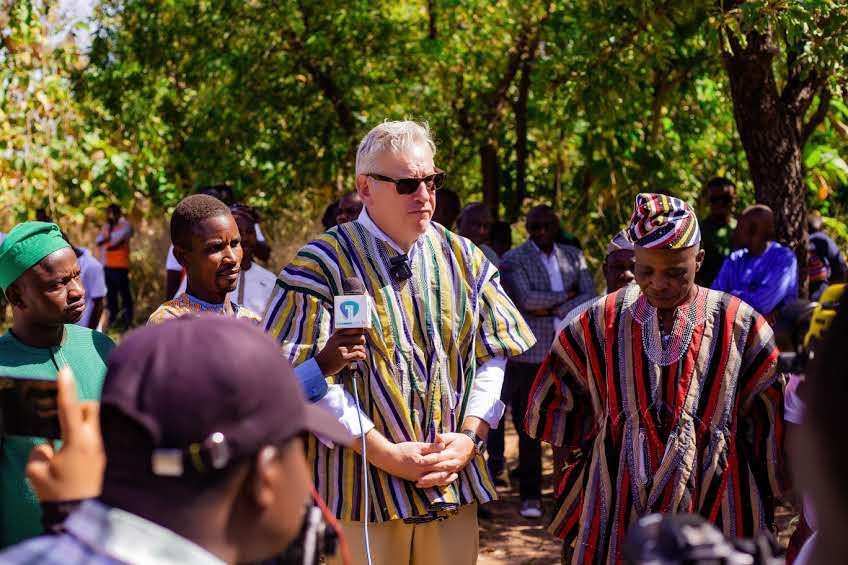
World Vision Ghana (WVG) and Catholic Relief Services (CRS), in partnership with World Agroforestry (ICRAF) and with funding from the European Union (EU), have officially launched the Regreening Africa Phase II (RA II) Project in Kukpalgu, Mion District, Northern Region.
This initiative marks a significant step in scaling up efforts to restore degraded landscapes, strengthen climate resilience, and improve livelihoods for smallholder farmers in the Bawku West, Garu, Tempane, and Binduri districts in the Upper East Region, as well as Yendi and Mion districts in the Northern Region of Ghana.Phase II aims to support and incentivize smallholder farmers and pastoral households to adopt diverse and profitable regreening practices.
The project will strengthen policy environments, improve local governance systems, empower women and youth, and stimulate greater investments in restoration efforts. It also seeks to promote evidence-based decision-making, ensuring communities, institutions, and governments rely on research and data to guide and adapt restoration strategies. A core aim is to expand opportunities within green and restoration-focused rural enterprises, particularly those involving youth, women, and tree-based value chains.
This phase is expected to generate widespread benefits, including increased adoption of regreening practices among at least 200,000 additional smallholder households, enhanced community resilience through healthier soils and more diverse agricultural systems, improved food and nutrition security, higher incomes, and strengthened green enterprises that create new opportunities for youth and women.
The program will also encourage broader use of research and evidence by governments, civil society, and private sector actors to guide restoration decisions.
This initiative builds on the continent-wide success of Phase I, which restored nearly one million hectares of land and supported over 600,000 households across eight African countries from 2017 to 2023. The project has received recognition as a UN World Restoration Flagship for its exemplary large-scale ecosystem restoration work.
The launch reaffirms Ghana’s commitment to the AFR100 Initiative, the UN Decade on Ecosystem Restoration, and national climate adaptation priorities.
Speaking at the launch, EU Ambassador to Ghana, Rune SKINNEBACH, stated, “We are here today because we also believe in solutions. We know that damaged land can be restored. The results of the first phase of the project are encouraging. We know that communities can adapt and succeed when they have the right tools and support.” He added, “The EU is proud to support the Regreening Africa initiative, building on strong results achieved in the first phase, and to continue the partnership with World Vision, Catholic Relief Services, and Center for International Forestry Research.”Northern Regional Minister Hon. Ali Adolf John emphasized the importance of the initiative, saying, “It is important for me to note that Government sees re-greening not as a project, but as a strategic pathway for climate resilience, food security, social stability, and economic transformation.
Therefore, I wish to pledge the support of the Northern Regional Coordinating Council to this project and to indicate our commitment to ensuring that the project succeeds.”Dr. Tinah Mukunda, National Director of World Vision Ghana, highlighted that in Phase I, over 5,452 households were reached and an estimated 5,117 hectares of land restored. She emphasized the collective commitment of the consortium to advancing sustainable restoration, empowering women and youth, strengthening value chains, and improving livelihoods.
Speaking on behalf of the Country Representative, Francis Gumah, Head of Programming at Catholic Relief Services Ghana, praised the power of partnerships, citing the establishment of the Northern Restoration Initiative, a multi-stakeholder platform for coordinated restoration planning and action across the Northern regions, as proof of success.
Phase II is implemented by a consortium led by CIFOR-ICRAF, together with World Vision, CRS, CARE, Sahel Eco, and Agronomes et Vétérinaires Sans Frontières (AVSF).
Regreening Africa is a sub-regional initiative operating in Ghana, Somalia, Ethiopia, Nigeria, Mali, Senegal, and Niger, aiming to reduce land degradation, restore landscapes, improve food and nutrition security, and enhance community resilience to climate change. With funding from the European Union, the program is implemented by CIFOR-ICRAF, World Vision, CRS, CARE, Sahel Eco, and Agronomes et Vétérinaires Sans Frontières (AVSF). Building on the results of Phase I, which supported over 600,000 households while restoring nearly one million hectares across eight African countries, Phase II promises to expand the program’s reach and deepen its impact. Regreening involves practices such as agroforestry, soil health improvement, Farmer-Managed Natural Regeneration (FMNR), and improved grazing management, which enhance soil health, improve community well-being, and increase resilience to climate change impacts.
The Phase II approach incorporates systems scaling to address the drivers of land degradation while promoting restoration through locally led intervention hubs and broader behavior change, policy reform, and value-chain investment. The program’s Research-in-Development model ensures that data and evidence guide decisions, while strong community engagement promotes equitable and lasting outcomes.
Regreening is critically important as Africa continues to experience severe land degradation, with an estimated 65 percent of productive land affected. This degradation undermines agricultural productivity, intensifies food insecurity, weakens livelihoods, and heightens vulnerability to climate extremes. Restoring degraded land enhances carbon capture, strengthens adaptive capacity, protects natural ecosystems, and supports sustained economic development.
Regreening Africa Phase II aligns strongly with regional and international restoration frameworks, including the AFR100 Initiative, the African Union Green Recovery Action Plan, and the Great Green Wall Initiative. Globally, the program supports commitments under the Paris Agreement, the UNCCD Land Degradation Neutrality targets, the Kunming-Montreal Global Biodiversity Framework, the UN Decade on Ecosystem Restoration, and the Bonn Challenge. Through these strategic alignments and collaborative efforts, the program aims to contribute meaningfully to a more sustainable, climate-resilient future for Ghana and the wider Sahel.
Source: mywordfmonline.com/Gaspard Adongo Ayuureneeya